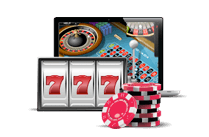From physics to online fun: The history of Roulette
 Ever wonder how Sin City got its name? Maybe it's all the free booze. Maybe it's the glutinous all-you-can-eat buffets that all those tourists stuff their faces at. Maybe it's the ladies of the night. Or maybe the Roulette wheel has something to do with it.
Ever wonder how Sin City got its name? Maybe it's all the free booze. Maybe it's the glutinous all-you-can-eat buffets that all those tourists stuff their faces at. Maybe it's the ladies of the night. Or maybe the Roulette wheel has something to do with it.
Add up all the numbers on the wheel - that's 1 through 36 - and you've got yourself a total that can only be described as devilish. Yup, 666. Legend has it that the inventor of the single zero Roulette wheel made a deal with the devil to obtain winning Roulette secrets.
Of course, that's just a tall tale, told to make the game seem more interesting. Not that Roulette needs it. The game is one of the most exciting, not just in Sin City, but at casinos all over Australia. And the history of Roulette is just as interesting. Read on to find out how the game went from a physics experiment to the real deal at the big Melbourne and Sydney casinos.
The man who started it all
 It's no secret that Roulette is all about odds, house edges, and statistics. So it should come as no surprise that the Roulette wheel was actually invented by Blaise Pascal, a French physicist, inventor, and mathematician. But Pascal wasn't trying to invent a casino game. In 1655, Pascal tried to invent a perpetual motion machine.
It's no secret that Roulette is all about odds, house edges, and statistics. So it should come as no surprise that the Roulette wheel was actually invented by Blaise Pascal, a French physicist, inventor, and mathematician. But Pascal wasn't trying to invent a casino game. In 1655, Pascal tried to invent a perpetual motion machine.
For non-scientists, that would be a machine that continues to operate without drawing energy from an external source. The laws of physics say it's impossible, but being an inventor, Pascal was attempting to defy the odds. His experiment failed, but the process gave birth to one of the most popular casino games of all time.
The invention of the zero
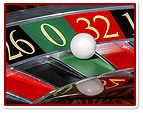 OK, we're not going to suggest that the number zero didn't exist until the 1800s. Anyone who knows anything knows that's not the case. But zero didn't exist on the Roulette wheel until the mid-19th century. In fact, the Roulette wheel as invented by Pascal remained the same for centuries. That all changed in 1842, when Francois and Lois Blanc designed a Roulette wheel with a single zero on it, specifically for King Charles III of Monaco. This was a massive deal because adding a zero gave the house a bigger house edge.
OK, we're not going to suggest that the number zero didn't exist until the 1800s. Anyone who knows anything knows that's not the case. But zero didn't exist on the Roulette wheel until the mid-19th century. In fact, the Roulette wheel as invented by Pascal remained the same for centuries. That all changed in 1842, when Francois and Lois Blanc designed a Roulette wheel with a single zero on it, specifically for King Charles III of Monaco. This was a massive deal because adding a zero gave the house a bigger house edge.
With his kingdom facing some financial trouble, Charles built a casino and brought the Roulette wheel to the masses. The wheel generated a lot of income for Monaco, and it quickly became an important symbol for Monte Carlo's culture of upscale gambling.
What's more, the Roulette wheel with the single zero hit the market at the same time that France had outlawed gambling, making Monte Carlo even more desirable.
Yes, you're seeing double
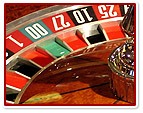 Americans like to make things their own. That's no secret. And Roulette wouldn't escape American influence. In the 1800s, Roulette made its way across the ocean and onto US shores. To give the house an even bigger edge, a double zero was added to the Roulette wheel. That means that instead of 37 numbers, the American Roulette wheel would have 38 numbers (1 through 36, 0, and 00).
Americans like to make things their own. That's no secret. And Roulette wouldn't escape American influence. In the 1800s, Roulette made its way across the ocean and onto US shores. To give the house an even bigger edge, a double zero was added to the Roulette wheel. That means that instead of 37 numbers, the American Roulette wheel would have 38 numbers (1 through 36, 0, and 00).
Predicting the results
 Did you know an Australian statistician is credited with figuring out how to beat the odds in Roulette? Michael Small of the University of Western Australia Perth studied Roulette wheels along with Chi Kong Tse of Hong Kong Polytechnic University. They figured out that if you know the precise location of the spinning ball and the speeds of the ball and wheel when the Roulette dealer (known as the croupier) releases the ball, you can figure out exactly what to bet on and increase your odds of winning.
Did you know an Australian statistician is credited with figuring out how to beat the odds in Roulette? Michael Small of the University of Western Australia Perth studied Roulette wheels along with Chi Kong Tse of Hong Kong Polytechnic University. They figured out that if you know the precise location of the spinning ball and the speeds of the ball and wheel when the Roulette dealer (known as the croupier) releases the ball, you can figure out exactly what to bet on and increase your odds of winning.
Unfortunately, it's hard to predict the odds in a regular casino setting. The researchers used cameras to record results, but that really isn't an option in a real casino. If you sit down at a Roulette wheel with any sort of electronic equipment, you'll be kicked out.
But the research does prove that Roulette is all about physics, so if you put your mind to it, if you really pay attention to what's happening at the wheel, you might be able to improve your odds significantly.
Roulette goes online
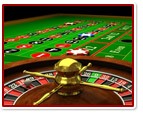 Up until the early 2000s, if you wanted to play single zero Roulette, you needed to head to Europe. If you wanted double zero Roulette, your best bet was the United States. But that all changed with the introduction of online Roulette casinos. No matter where in the world you live, online casinos give you the option to play any online Roulette variation.
Up until the early 2000s, if you wanted to play single zero Roulette, you needed to head to Europe. If you wanted double zero Roulette, your best bet was the United States. But that all changed with the introduction of online Roulette casinos. No matter where in the world you live, online casinos give you the option to play any online Roulette variation.
The future of Roulette
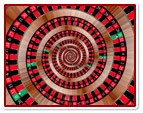 Now that you know the history of Roulette, where do you think the future lies? Another zero on the wheel? Better payouts? A change in odds? More realistic online Roulette wheels? The only way to find out is to pay attention, so keep playing and have fun.
Now that you know the history of Roulette, where do you think the future lies? Another zero on the wheel? Better payouts? A change in odds? More realistic online Roulette wheels? The only way to find out is to pay attention, so keep playing and have fun.

